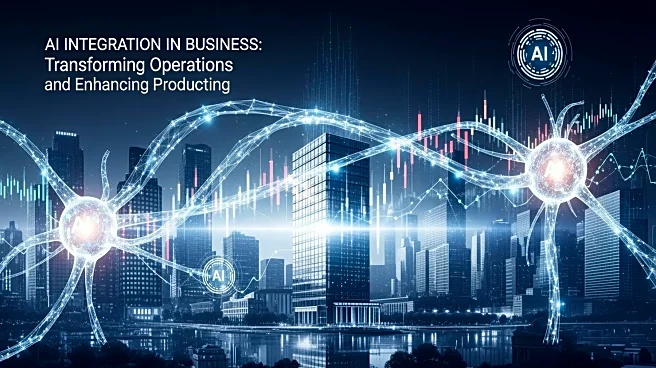What's Happening?
Businesses are increasingly integrating artificial intelligence (AI) into their operations, not merely as a technological upgrade but as a fundamental shift in how work is conducted and value is generated.
AI is being used to rebalance labor, capital, and energy, allowing companies to transform cost centers into profit engines. For instance, Procter & Gamble has implemented AI-powered sensors in its production lines to continuously monitor quality, thereby reducing waste and freeing employees for higher-value tasks. This approach is likened to the rise of the internet, where companies initially made tentative adaptations but eventually embraced new internet-powered business models due to competitive pressures. AI is now seen as a competitive necessity, prompting businesses to plan multiyear transitions to new models.
Why It's Important?
The integration of AI into business operations is significant as it offers a pathway to increased productivity and efficiency, especially in an era where labor availability is constrained and capital investments are scrutinized. By automating low-value, repetitive tasks, AI allows human workers to focus on more strategic and creative endeavors, potentially leading to innovation and growth. Companies that effectively leverage AI can gain a competitive edge, as seen in the case of Unilever, which uses AI to streamline hiring processes, reducing time and improving candidate quality. The broader impact includes potential shifts in employment patterns, with AI handling tasks that are error-prone or privacy-sensitive, thus reshaping job roles and industry standards.
What's Next?
Businesses are encouraged to plan for AI integration by identifying areas where AI can outperform existing processes in terms of speed, cost, and efficiency. This involves assessing tasks that can be automated or augmented at a lower cost and identifying issues that AI can address due to capacity constraints. As AI technology continues to develop rapidly, companies must anticipate future capabilities and prepare to adapt their operations accordingly. The focus should be on progress rather than perfection, with organizations prioritizing systems that are faster, better, and cheaper than current methods.
Beyond the Headlines
The ethical implications of AI integration in business are profound, particularly concerning systematized bias in AI-based HR screening systems. Responsible use with human oversight is crucial to ensure fairness and diversity in hiring practices. Additionally, the shift towards AI-driven operations may lead to significant changes in workforce dynamics, requiring new skills and training for employees to adapt to evolving roles. The long-term cultural impact includes redefining the nature of work and potentially altering societal perceptions of labor and productivity.










